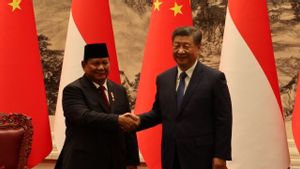JAKARTA - The corona virus pandemic or COVID-19 that has spread throughout the world is predicted to cause a global economic crisis. However, the crisis caused by this outbreak was not like the 2008 crisis, which was known as subprime mortgage in the United States (US).
Former Minister of Finance of the Republic of Indonesia Chatib Basri said the government's handling of the crisis in 2008 was much easier. The crisis at that time only affected Indonesia's trade and exports. However, this impact can be overcome immediately with government policies that focus on domestic consumption.
"The government at that time made a fiscal stimulus that was focused on the domestic sector, by boosting purchasing power. Indonesia was the country that could grow the highest in the world, at 4.6 percent at that time. Because we succeeded in moving its external problems to focus on the domestic sector," said Chatib Basri. in a virtual discussion with the theme 'State Budget Strategy in the Middle of COVID-19 and the Risk of a Global Economic Recession', in Jakarta, Tuesday, April 21.
However, said Chatib, the situation faced by the government and the world today was very different in the 2008 crisis. The COVID-19 virus pandemic hit not only the supply sector, but also demand. In fact, Indonesia suffered a major blow. This is because China is Indonesia's largest export destination country for coal and palm oil.
The COVID-19 virus, which was first discovered in Wuhan, China, made the local government take lockdown steps to prevent the spread of the virus. However, now the virus has spread throughout the world. In fact, China, which had already improved its condition, is back against this second wave of viruses.
According to Chatib, the impact of the second wave of the COVID-19 virus in China, demand fell and affected the Indonesian government tax revenue. In addition, investment, consumption and public purchasing power have become depressed.
In addition, he continued, when compared to the 2008 crisis which impacted the middle and upper middle class, the COVID-19 pandemic actually affected almost all segments of society, including the middle to lower class.
However, Chatib said, Indonesia is one of the countries whose economy is predicted to be able to grow positively this year. Therefore, the government's steps which are currently focused on handling and preventing the COVID-19 virus need to be appreciated.
On the other hand, Chatib assessed that the three focuses that the government must do for handling COVID-19, are handling health, social assistance and helping the sustainability of the business world. Meanwhile, for the short term, he said, fiscal policy must be focused on the health sector.
Chatib said that one of the consequences in preventing the spread of COVID-19 was the application of large-scale social distancing (PSBB) or social distancing, so that the government had to provide social protection in the form of compensation. If not, then the PSBB or social distancing rules will not work.
In addition, the current difficult conditions in the business world will result in high levels of layoffs (PHK). According to Chatib, in the next six months, many companies will not be able to pay installments. So it is important for the government to provide relaxation to the business world.
Stimulus Can Be Added
Chatib assessed that there were still many budget items that could still be trimmed to be reallocated for handling the COVID-19 pandemic. So, the stimulus for handling the negative impact of the COVID-19 virus can be sharpened or added. One of them, through the official travel budget.
"The official travel budget is around Rp. 43 trillion for 2020 and it has been cut to Rp. 25 (trillion)," he said.
Chatib argued that under the current conditions of the PSBB, of course, the state civil apparatus (ASN) could not travel outside the city. So, the budget could be cut more this year.
Not only that, Chatib also suggested that the government could cut the physical capital expenditure budget even more. Especially, in the post of infrastructure development expenditures whose activities can still be carried out next year.
"If a large amount of physical capital is spent, people can't work in these conditions now. There are many activities that cannot be executed," he said.
Even so, Chatib assessed that the cut required commitment from all ministries and agencies (K / L). "If not, he will protest the Ministry of Finance later," he said.
In addition, according to Chatib, infrastructure projects to 2021 are to focus the budget on COVID-19. The problem is that even though the government has allocated a large amount of funds, it cannot be denied that there is a need for more funds.
"In this year, it will be postponed first, focus on those three things. Later in 2021 we can start another in terms of reallocation of its budget," he said.
On the other hand, he also asked for budget reallocation to be focused especially on urban communities. The reason is that most of the COVID-19 cases have occurred in urban areas. "This budget is limited, only focus on urban areas. High food demand in urban areas, focus there," he concluded.
For information, the stimulus issued by the Indonesian government is 2.6 percent of GDP. Meanwhile, Australia has poured out 189 billion US dollars or 9.7 percent of its GDP for stimulus in overcoming the COVID-19 pandemic. The United States allocates 2.1 trillion US dollars or 10.5 percent of GDP.
In Singapore, it allocated 54.4 billion US dollars or 10.9 percent of GDP, and in Malaysia the stimulus reached 17 percent of GDP.
Meanwhile, countries that provided less stimulus than Indonesia included France 45 billion euros or 2 percent of GDP and Italy 25 billion euros or 1.4 percent of GDP. Even China, as the country where the spread of COVID-19 started, only allocated 1.2 percent of GDP.
The English, Chinese, Japanese, Arabic, and French versions are automatically generated by the AI. So there may still be inaccuracies in translating, please always see Indonesian as our main language. (system supported by DigitalSiber.id)












